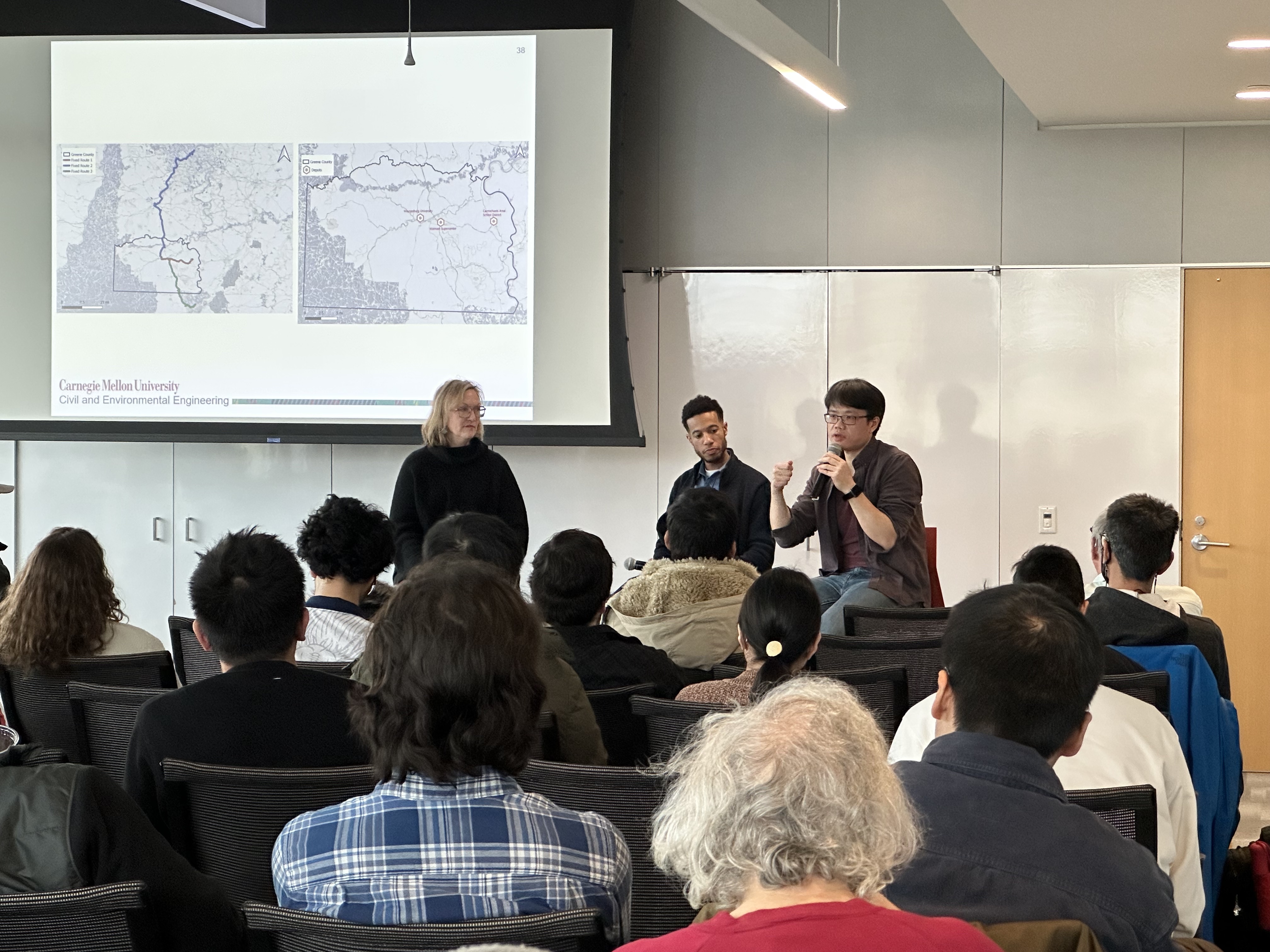
Decarbonization and Transportation: Exploring Equity, Interdependency and Sustainability Through Research and Conversation
By Anthony Wallace, Wilton E. Scott Institute for Energy Innovation Intern
Media InquiriesOn January 30th, the Wilton E. Scott Institute for Energy Innovation began our Spring 2024 event schedule by hosting the Intersection of Energy and Transportation Panel to explore the intersection of transportation and decarbonization. With CMU Energy Week 2024 right around the corner, this event offered a preview of the exciting conversations to come March 19th - 21st, when the energy innovation community convenes on campus to address pressing challenges in the transportation sector.
During this event, our panelists and faculty affiliates Corey Harper and Sean Qian presented their research on decarbonizing transportation systems and answered questions in a conversation moderated by Karen Lightman, the Executive Director of Metro21: Smart Cities Institute and Interim Executive Director of Safety21, the US DOT National University Transportation Center for Safety. Harper, an Assistant Professor of Civil and Environmental Engineering and at the Heinz School of Information Systems and Public Policy, shared research conducted in the Future Mobility Systems Lab, where he serves as director and leads a team of researchers exploring infrastructure, policy and equity implication of emerging transportation technologies. During his presentation, he shared insights on transitioning from our current transportation systems to smarter, more sustainable alternatives and the benefits of leveraging micromobility to reduce SOV travel. While utilizing micromobility modes to replace SOV usage on short trips can help increase travel speeds and mitigate congestion, Harper emphasized the importance of larger-scale solutions to reduce emissions.
“Bikes are mostly going to be able to replace short trips, but a lot of your emissions during peak hours come from long trips. So even if we get to the upper bound, we’re seeing only a 2 percent decrease in emissions. So 98 percent of your emissions would still exist. What this shows is that you need to do a lot more than get people out of cars and onto bikes. You need to electrify cars, buses and trucks and you need to find a way to extend commuter transit. So extend commuter rail, commuter buses, so you can capture some of those longer trips from people traveling from suburban areas to downtown urban cores.”
Sean Qian centers on this complexity and the need for multiple solutions in his research, which focuses on understanding infrastructure system interdependence. A jointly appointed professor in the Department of Civil and Environmental Engineering and Heinz College of Information Systems, Qian emphasized the interdependency of transportation and energy systems in his presentation, “My vision is that everything is so interconnected…it’s gigantic networks of many different pieces. Anything you do in one single part is likely to have a ripple effect on many other things. What’s connecting all these networks are human beings.”
To reach our energy goals and create impactful, lasting change in these systems, both researchers found that thoughtfully considering the human element of the challenge is central to maintaining equity. Reflecting on his research, Qian said, “To a lot of disadvantaged communities, my understanding, at least from the rural project I’ve been working on, is that it’s almost a trap. Because the less mobility they are being provided, the less they’re getting out to access or even look for jobs, and it’s then less likely that they can afford electric vehicles or even pay for public transportation services. So how can we stop that loop to get people to the places they want?”
Both researchers insist that breaking the loop requires centering the voices of disadvantaged people. Harper added, “You have to look at things that signify a need for transit. So people not having access to transit now, people not owning personal vehicles, people being low income––things that would signify need. Then you could start to look at those populations, target them and then deploy a more equitable system.”
Click here to watch the Intersection of Energy and Transportation Panel.
Learn more about CMU Energy Week 2024 and our other upcoming events.